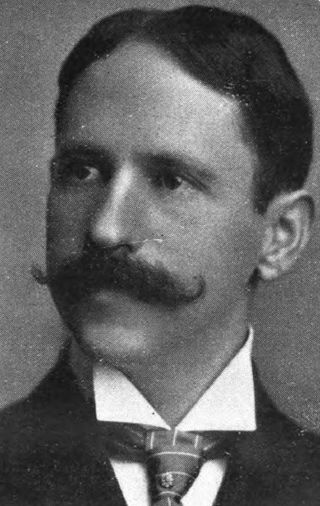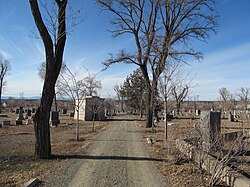
Arthur Seligman was an American businessman and politician. He served in several offices in New Mexico, including mayor of Santa Fe and governor.

Ratón Pass is a 7,834 ft (2,388 m) elevation mountain pass on the Colorado–New Mexico border in the western United States. It is located on the eastern side of the Sangre de Cristo Mountains between Trinidad, Colorado and Raton, New Mexico, approximately 180 miles (290 km) northeast of Santa Fe. Ratón is Spanish for "mouse". The pass crosses the line of volcanic mesas that extends east from the Sangre de Cristo Mountains along the state line, and furnishes the most direct land route between the valley of the Arkansas River to the north and the upper valley of the Canadian River, leading toward Santa Fe, to the south. The pass now carries Interstate 25 and railroad tracks.

Santa Fe National Cemetery is a United States National Cemetery in the city of Santa Fe, in Santa Fe County, New Mexico. It encompasses 84.3 acres (34.1 ha), and as of 2021, had 68,000 interments. Administered by the United States Department of Veterans Affairs, it is one of two national cemeteries in New Mexico. It was listed on the National Register of Historic Places in 2016.

Santa Fe No. 5000 is a 2-10-4 "Texas" type steam locomotive constructed by Baldwin Locomotive Works in 1930 for the Atchison, Topeka and Santa Fe Railway. No. 5000 was immediately nicknamed the "Madame Queen" and remained a unique member of its own class. It was donated to the City of Amarillo, Texas in 1957 and is currently maintained by the Railroad Artifact Preservation Society. Santa Fe 5000 is on the National Register of Historic Places.

The Santa Fe Plaza is a National Historic Landmark in downtown Santa Fe, New Mexico in the style of traditional Spanish-American colonial cities. The plaza, or city square is a gathering place for locals and also a tourist attraction. It is home to annual events including Fiestas de Santa Fe, the Spanish Market, the Santa Fe Bandstand, and the Santa Fe Indian Market.

Old Upper Springfield Friends Burying Ground is a cemetery located in Springfield Township and Wrightstown, in Burlington County, New Jersey.

The Santa Fe Trail Remains, also known as Santa Fe Trail Ruts, are a two-mile (3 km) section of the former 1,200-mile (1,900 km) long Santa Fe Trail, described as the "longest continuous stretch of clearly defined Santa Fe Trail rut remains in Kansas." Now owned by a preservation organization, the site is visible from a pull-off area on United States Route 50 near Dodge City, Kansas. The site was declared a National Historic Landmark in 1963.

The Raton Downtown Historic District is a historic district listed on the National Register of Historic Places in Raton, New Mexico, USA. The district, when first listed in 1977, is bounded on the north by Clark Avenue and on the south by Rio Grande Avenue. On the east, the district is bounded by First Street, and on the west the district is bounded by Third Street. The district covers about 200 acres (81 ha) and contains 95 significant buildings. The district was enlarged in 2015.

William Taylor Thornton was an American politician who served as the 15th Governor of New Mexico Territory from 1893 to 1897.

The Santiago E. Campos United States Courthouse is a historic courthouse building located at Santa Fe in Santa Fe County, New Mexico. Formerly designated simply as the United States Courthouse, it was renamed for the late District Judge Santiago E. Campos in 2004.

St. Peter's Episcopal Church is a historic church at Rector and Gordon Streets in Perth Amboy, Middlesex County, New Jersey. It is the oldest Episcopal parish in New Jersey and contains the oldest extant gravestone in New Jersey. The church building, built from 1849 to 1852 in Gothic style, was added to the National Register of Historic Places on May 12, 1977 for its significance in religion.

Agua Mansa is a former settlement in an unincorporated area of San Bernardino County, near Colton, California, United States. Once the largest settlement in San Bernardino County, it is now a ghost town. Only the cemetery remains.

Nuestra Senora de Luz Church and Cemetery is a historic church building 13 miles southeast of Santa Fe, north of Interstate 25 frontage road in Canoncito, New Mexico. It was built in 1880 and added to the National Register of Historic Places in 1995.
Cañoncito is an unincorporated community in Santa Fe County, New Mexico, United States. Cañoncito is located on Interstate 25, 11.5 miles (18.5 km) southeast of Santa Fe. Nuestra Señora de Luz Church and Cemetery, which is listed on the National Register of Historic Places, is located in Cañoncito.

Adamsville was a populated place in Pinal County, Arizona. Once a thriving farm town, it became a ghost town by the 1920s. Adamsville is located at an elevation is 1,450 feet, on the south bank of the Gila River, west of Florence, Arizona.

The George Washington Grover House is a two-story house located at 1520 Market in the East End Historic District of Galveston, Texas. Built in 1859, the house is one of the oldest brick residences in the city.

The Charles W. Lewis Building is a historic building in the Barelas neighborhood of Albuquerque, New Mexico. It is listed on the New Mexico State Register of Cultural Properties and the National Register of Historic Places. It was built around 1882 by Charles W. Lewis (1844–1901), a native of Peralta, New Mexico who came to Albuquerque in 1873. Lewis was one of many Albuquerque residents to get involved in land speculation as the Atchison, Topeka and Santa Fe Railway approached the town in the late 1870s. Once the railroad arrived, Lewis was able to subdivide a valuable piece of land near the tracks and used one of the lots for the building described here, which was probably built as rental housing. In 1915 it was reportedly being operated as a saloon.


















